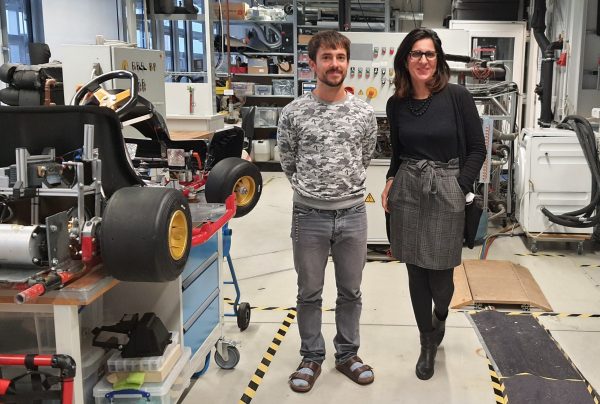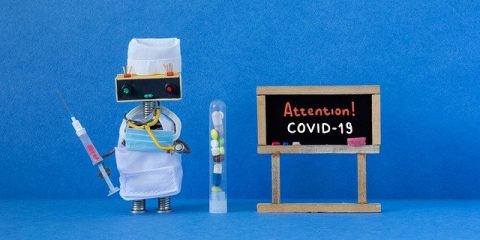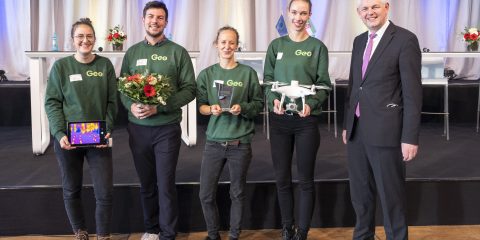Finally, the new federal government is putting the expansion of renewable energies at the top of its agenda. A rapid expansion of wind and solar power is planned by 2030. More speed in the energy transition is sorely needed in order to achieve the climate goals and to master the coal phase-out. But it is an extremely ambitious goal, because there is a shortage of young professionals in many of the MINT professions required for the energy transition. Radojka Ille is the coordinator of the zdi student lab Energiewende makes school and wants to put a stop to the shortage of skilled workers. Together with her colleagues in the zdi student laboratory, she is pursuing a clear goal: young people should be made aware of the energy transition and encouraged to redesign their own "energy world".

By showing new perspectives and career opportunities. We spoke to Radojka Ille about a future worth living in, flexible course concepts and the building blocks of the energy transition.
Ms. Ille, the new federal government announced in the coalition agreement that it would make the expansion of renewable energies a central project in its government work. Why is the energy transition such an important topic right now?
The energy transition has actually been an important topic for a long time and is also enshrined in law. It is a firm decision that will be used to phase out coal and nuclear power. Unfortunately, the conversion from fossil fuels such as coal, natural gas and oil to renewable energies is progressing very slowly. You have to imagine it: Our entire system, our entire infrastructure, our prosperity - everything is built on energy. And the resources of our planet are slowly coming to an end. A massive expansion of renewable energies is therefore required to maintain our social system so that we will continue to have energy available to live in the future.
Another explosive factor in this context is climate change. Our hunger for energy increases the greenhouse effect immensely and the consequences are visible to all of us, for example if we look at this year's flood disaster in the Ahr Valley. And thats just the beginning. If we don't act now, it will be too late. That's why I think it's really important that everyone is informed about the need for the energy transition, especially young people. They more than deserve to be supported in the mammoth task of preserving a world worth living in.
zdi student lab on the energy transition goes to school
The zdi student laboratory Energy transition makes school im Center for Innovative Energy Systems (ZIES) at the Düsseldorf University of Applied Sciences is a state-of-the-art and very well-equipped place of learning. Here, students from the 7th grade and all school types are inspired to build, experiment and research. The focus is on renewable energies.
Was that also the reason why you founded the zdi school laboratory Energiewende macht Schule?
Exactly, that's why we wrote the application back then. All our work is based on this: We want to pass on our knowledge to the students and show them that there are ways to make the entire energy supply sustainable and to ensure that climate change stagnates. Most students are very interested in the topic of the energy transition, even in the 7th grade. Some are hesitant at first, but at the latest when the keyword climate change comes up and it becomes clear to them that climate change can be stopped by expanding renewable energies, then they too are enthusiastic. It's not at all important to us that everyone decides in favor of an engineering profession. We are also concerned with raising awareness and awareness of the topic of sustainability and showing that everyone can make their contribution. The teachers are also incredibly interested in the topic. And all the better if the energy turnaround is once again being put more firmly on the political agenda.
What specific measures have you developed to get students excited about the energy transition?
We have developed seven course concepts that are designed around the energy transition. With the help of the courses, the students can deal with climate change, with the future power supply, heat supply, mobility, energy storage, etc. In other words, all subject areas that play a major role in the energy transition. The concepts are designed in such a way that the students have fun learning about the energy transition. The courses are neither dry nor boring, but consist of different building blocks that loosen up the course and still impart the desired knowledge. For example, we have an interactive climate quiz with the EnergyAgencyNRW developed in cooperation, we carry out demanding experiments on all aspects of renewable energies and use targeted simulation games, such as e.g Keep coolthat from Potsdam Institute for Climate Impact Research (PIK) was developed. Of course, there is also input from us at the beginning, but it is kept short and designed like a lecture, so that the students get an insight into everyday university life at the same time.
What is the feedback on the courses of your student laboratory?
The feedback is consistently positive, we always get very good marks from the students. We're really glad! The feedback from the schools and teachers is also great and we have more inquiries than we can implement courses. When designing the course, we followed the curriculum, which is great for teachers. We are also happy to respond to the wishes of the teachers, the concept of each course can be easily adapted. A visit to our school laboratory with the whole class can be easily integrated into the lesson. If the students cannot come to us at the university, we also go to the schools. We have also designed our school laboratory to be mobile.
Can your concept also be implemented by other zdi networks and zdi student laboratories?
Yes absolutely. It is my dream that there will be places like the school laboratory Energiewende macht Schule in NRW, if not throughout Germany, where children and young people can go and learn about sustainability and renewable energies. School labs that want to contribute to the energy transition can get in touch with me. We are happy to make our concepts available to the zdi community. This is a task of the century that we are all facing. Every school laboratory that helps to sensitize children and young people to the topic at an early age is worth its weight in gold. We urgently need young STEM people to continue implementing the energy transition. And there is every kind of MINT knowledge in the energy transition. Be it mathematics or technology, natural sciences or computer science. As the issue for young people also due to the Fridays for Future movement is very accessible, many STEM disciplines can be opened up that may seem daunting to some students at first glance.

What do you wish for the future of extracurricular MINT education?
I wish that more extracurricular actors would deal with the topic and that together we could reach many students and give them hope along the way. So that they can see that there are prospects for the future. The media often plays with fears and paints a dystopian picture. We can take away these fears from the students by showing them ways in which the world can be made sustainable. And in the best-case scenario, they find all of this so interesting and important that they choose a profession that deals with aspects of sustainability. It doesn’t always have to be an engineering profession, professions in the fashion industry, packaging industry or food companies can also influence our use of energy and make our environment better.
Many thanks for the interview!
The Center for Innovative Energy Systems (ZIES) at the Düsseldorf University of Applied Sciences, headed by Prof. Mario Adam, is researching future-oriented and sustainable technologies based on renewable energies. A special concern is also the sensitization of the population, especially the younger generation, for the challenge of the energy transition and topics related to climate change and climate protection. The zdi school laboratory, which was designed and implemented at ZIES under the leadership of Rada Ille, offers schoolchildren not only informative building blocks but also exciting, practical tabletop experiments, which convey fundamental connections and are intended to inspire young people to take up a technical profession.
More information about the Center for Innovative Energy Systems (ZIES) here.
You can find all information about the zdi school laboratory Energy Transition Makes School here.


